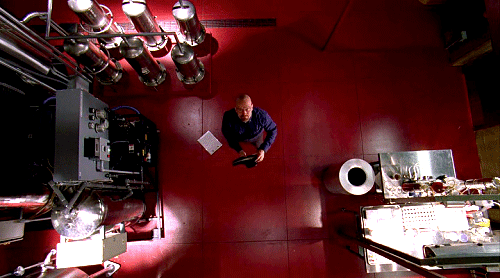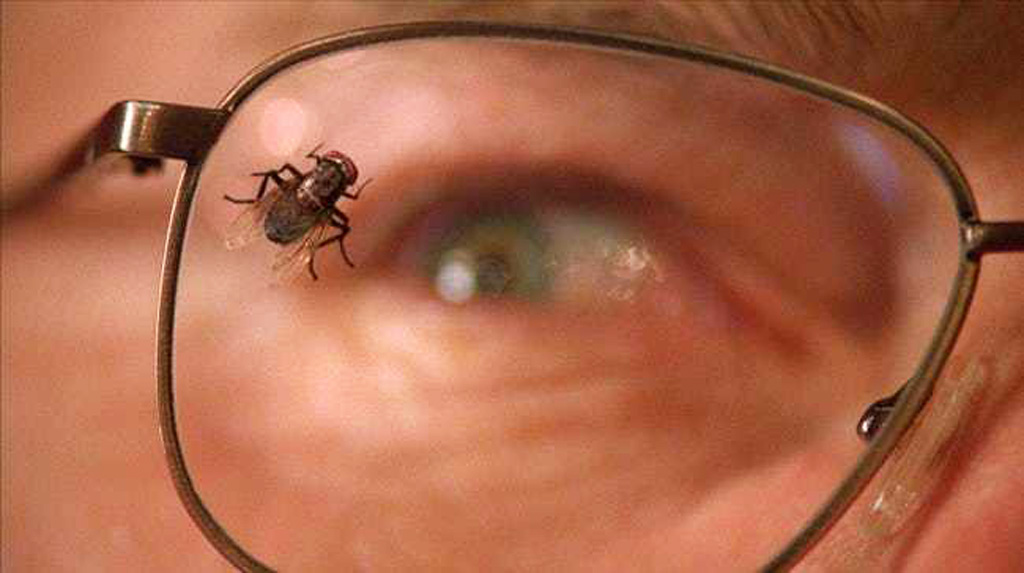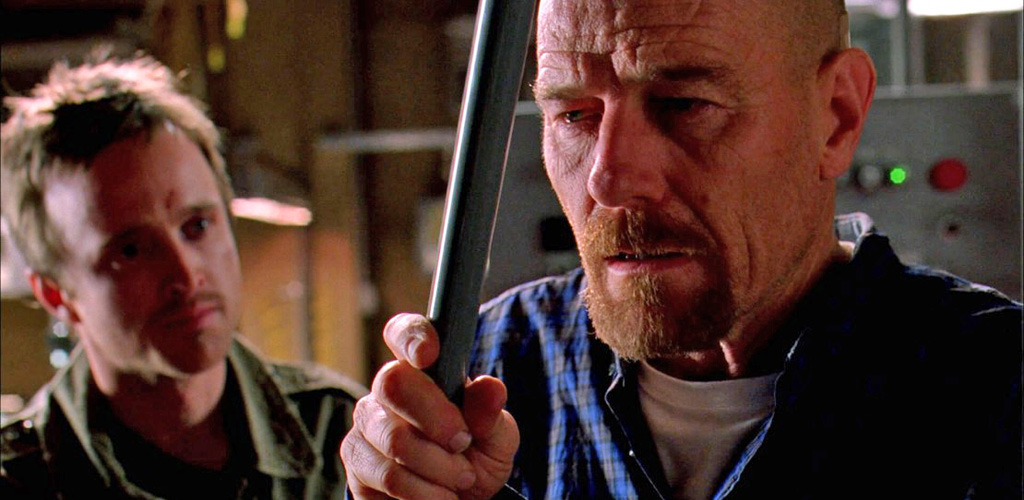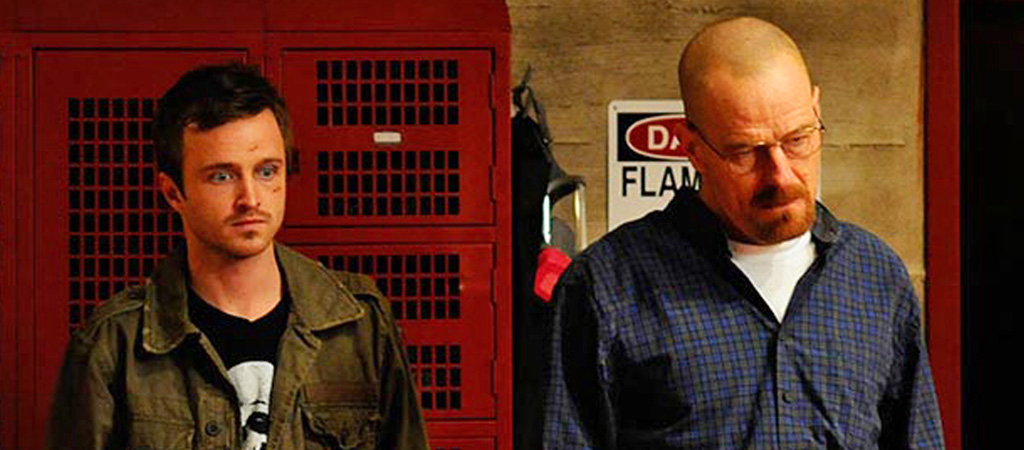Ahead of Breaking Bad‘s Netflix sequel movie, El Camino, I hereby confess to a weakness for “bottle episodes.” When they work, they’re fantastic — often heavy on dialogue and emotion and dynamic development, and chock full of reminders of past grievances and hints of more conflict to come. Production teams love these episodes because they’re limited in setting and cheaper to crank out. They’re also primers on how and why characters relate to each other in the varying ways that they do. Suspicions surface, motivations expose themselves, and maybe a resolution occurs, but often not. What matters is that we received a Walter White/Jesse Pinkman counterpart to The Sopranos‘ “Pine Barrens,” all drenched in nihilism and suggesting high-stakes revelations. Or Atlanta‘s “Teddy Perkins” when it comes to packing a tension-filled, unsettling punch. Or even like Justified‘s “Blowback” in terms of playing with authority-figure dynamics. All these bottle episodes succeed, but none of them do so the same way as Breaking Bad‘s third season effort, “Fly.”
Really, if you’ve got very little catch-up time — and let’s face it, you’re a busy person with a stuffed Netflix (and Hulu and Amazon and HBO) queue already — this is one episode to revisit before El Camino arrives on October 11.
Alan Sepinwall loved “Fly” when it aired, and the thing still holds up. I’ve rewatched this Rian Johnson-directed episode twice ahead of the Jesse-centered movie, and there’s a reason why it lands on almost every top 10 episode list (including our own). I do think it’s my favorite of the series. Yes, I’m serious and unsophisticated and realize that most folks prefer “Ozymandias” or “Felina,” and I’ll take those punches. Yet “Fly” acts as a companion to the scene that Aaron Paul recommended rewatching within a season 3 episode, “One Minute,” when Jesse attempts to shove Walt out of his life. That’ll catch you up on Jesse’s mindset going into the film, but “Fly” comes a few episodes later. It fleshes out the structure behind the corrupt dynamic, and it shows Walt unable to steer the train no matter how hard he struggles. It’s funny, and oh, it’s dark.
We begin with Walt crunching numbers in his lab (now his refuge from his shattered world), and soon enough, he’s lunging with a clipboard at an insect. This swiftly devolves into busted glass, a terrible fall, and (oh yes) a boot thrown in desperation and futility.

And yet.

Of course, none of this drama so far is really about a fly.
Yet all the persistent annoyance dredged up by this buzzing nuisance keeps tensions high. It’s a splendidly executed episode, and the absurdity of Walt’s quest leaves Jesse looking like the completely levelheaded one, as soon as he reenters the scene to a wild-eyed Walt. The man known as Heisenberg, who runs a meth manufacturing empire (despite the supposed 50/50 partnership at hand), is now gripped within a paralyzing fear of losing that control. At least, that’s the widely accepted interpretation of this episode, given that Walt rants about this tiny “contamination” that could, as he declares before episode’s end, leave them dead if the menace is not eradicated.
So yes, Walt’s vomiting his control issues. He’s lost his way at home again, and the collateral damage from his actions (or inaction, when it comes to Jane) splintered into hundreds of deaths from those two commercial airplanes. His precious lab is really all that he’s got left, and he needs to command something, anything at all. Well, the fly is not that thing but leads to another major theme of this episode, which is the mutual betrayal between partners that later explodes in the final season. The seeds of that final blowout are planted here like insect eggs upon the slowly rotting carcass of Jesse and Walt’s relationship.
This is the episode where Walt begins to strongly suspect that Jesse’s been skimming off each batch of meth, and the teacher later confronts the pupil while explaining that he cannot protect him if this information comes to light. Indeed, Jesse is doing so (though he won’t admit it) and not because he needs the money. Hell, he and Walt are rolling in cash already, but Jesse appears to be secretly hoping that he will face retribution for his actions. He feels enormous guilt over Jane’s death, and he’s not the only one.
Ultimately, the episode really refreshes a repeat viewer on everything they need to know about Jesse’s psyche before El Camino arrives. We get some fantastic monologuing from him (from mundane justifications about how many unwanted objects end up in hot dogs to ramblings about wild animals invading homes), and we hear a sleeping-pill compromised Walt tiptoeing toward that gut-wrenching confession that he doesn’t actually make until season 5. When Walt finally tells Jesse the full truth of Jane’s death in “Ozymandias” — how he watched Jane die and chose not to save her — he does so cruelly and vengefully, after four more seasons of buildup and after Hank’s death, which was indirectly caused by Jesse’s final betrayal. That retaliatory approach probably hit Jesse especially hard, given the quarter-truth that Walt spilled in “Fly.”
It’s no wonder that Breaking Bad viewers prefer “Ozymandias” as a favorite episode, due to the enormity of happenings that finally drove Walt to deliver that devastating confession to Jesse. Yet I still prefer “Fly,” when Walt is all doped-up and on the verge of doing the same. There’s a will-he-or-won’t-he aspect that’s almost humorous, especially given that Walt’s prone to incriminate himself while under the influence of any sedative (remember the burner phone mess?). There’s something vaguely seductive about how Breaking Bad handled dark comedy while prolonging the inevitable.

Not only that, but the stark setting of the lab and the simple episode premise allows for a closer focus on Jesse and Walt’s relationship without intervening parties. It’s here that we see glimpses of both men being capable of partner-betrayal, in the past, present, and future. There are slapstick moments amid incredibly serious beats like Jesse observing Jane’s old cigarette before encountering a partner who’s raving about the need to serve up “unadulterated” poison to their customers. Walt’s carrying an impossibly heavy burden, and deservedly so, but we get some incredible emotion from both men here. That’s especially the case when Walt’s discusses inadvertently talking about kids and the meaning of family at a bar with Jane’s dad on the night of her death.
There’s an apology, too, although it’s the wrong kind of apology, and Walt never does get to savor (or even witness) the pair’s moment of victory when Jesse kills that damn fly. In a way, this mirrors the Breaking Bad finale, given that Jesse getting out alive might not be the victory that anyone would really want. As Walt wearily says near the end of “Fly,” no matter what, “It’s all contaminated.”
We’ll see exactly how contaminated everything remains when Netflix drops El Camino on October 11.







